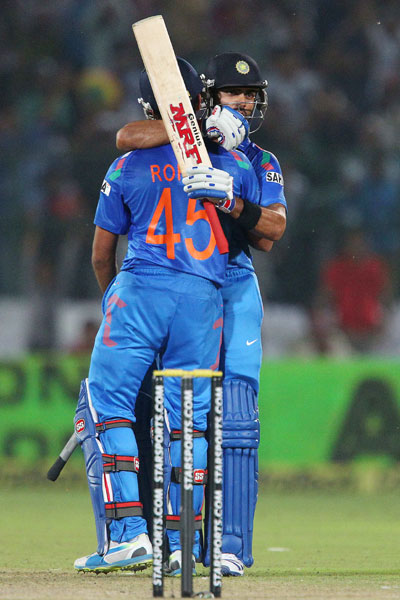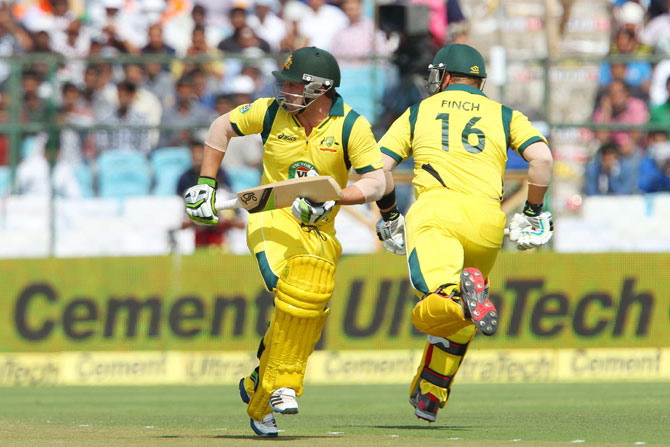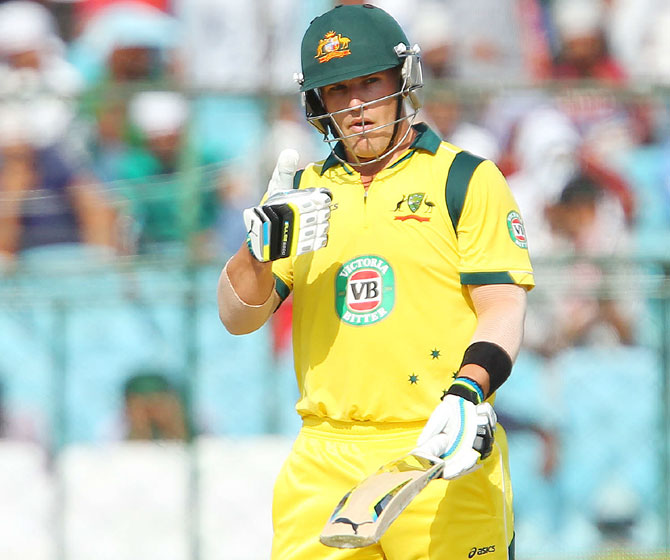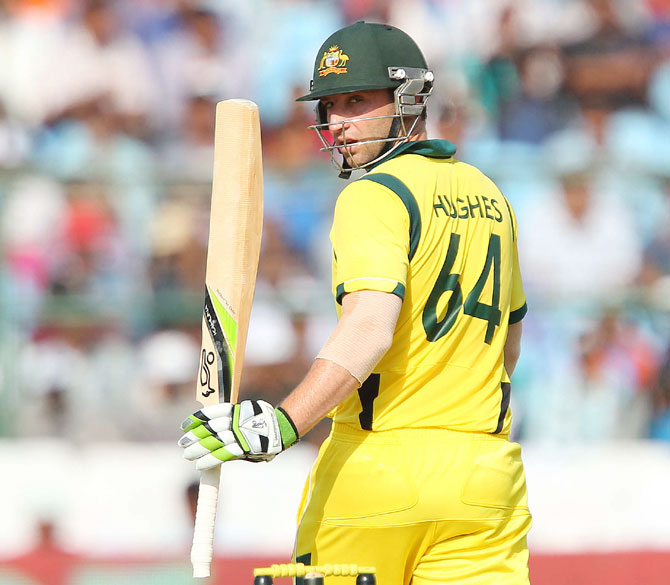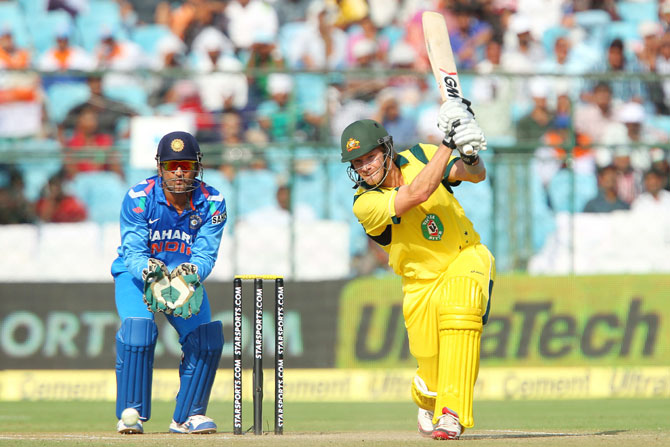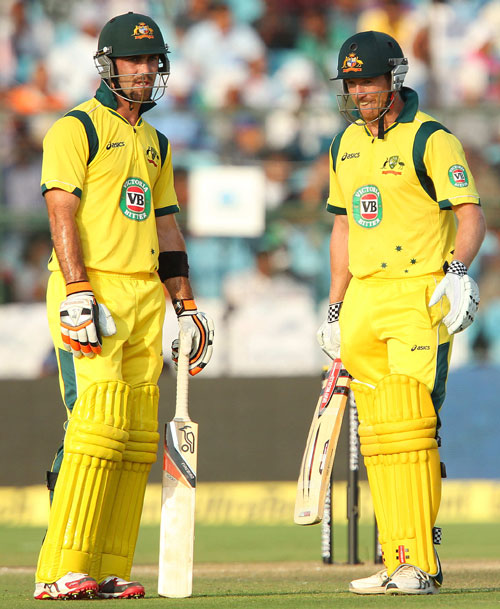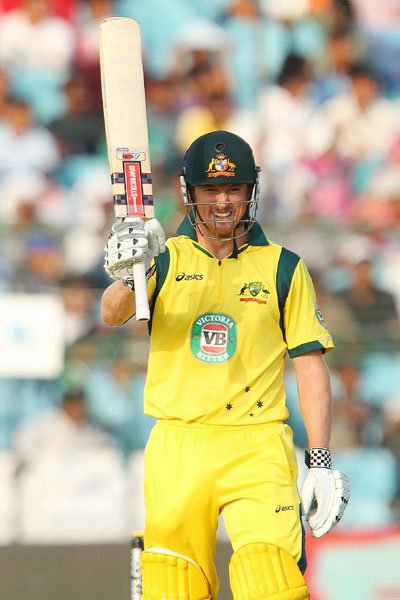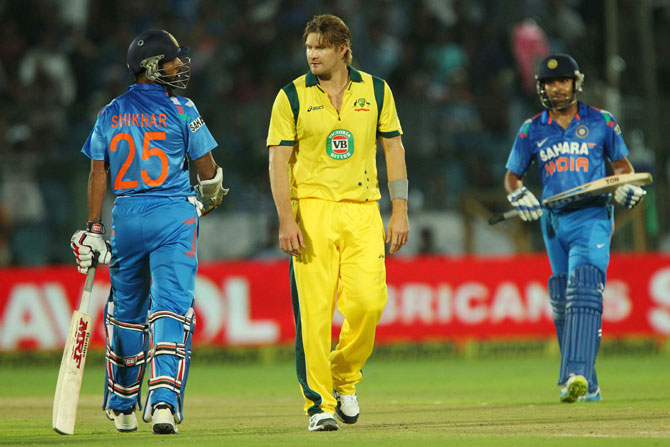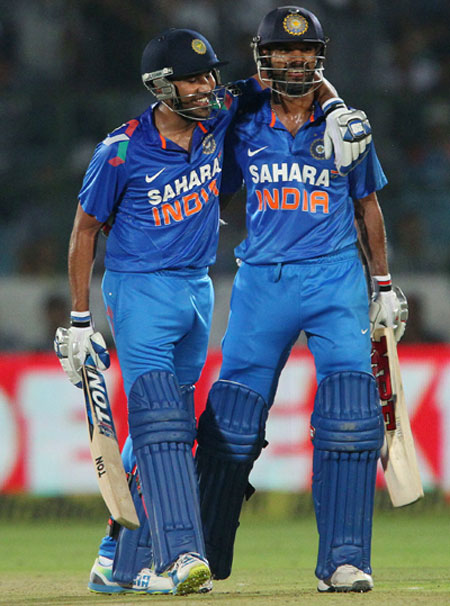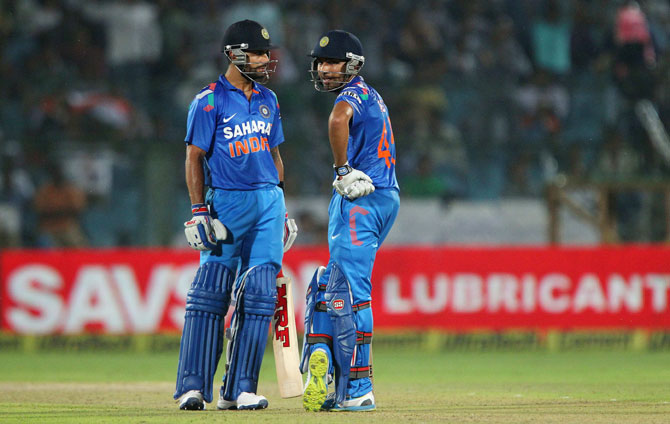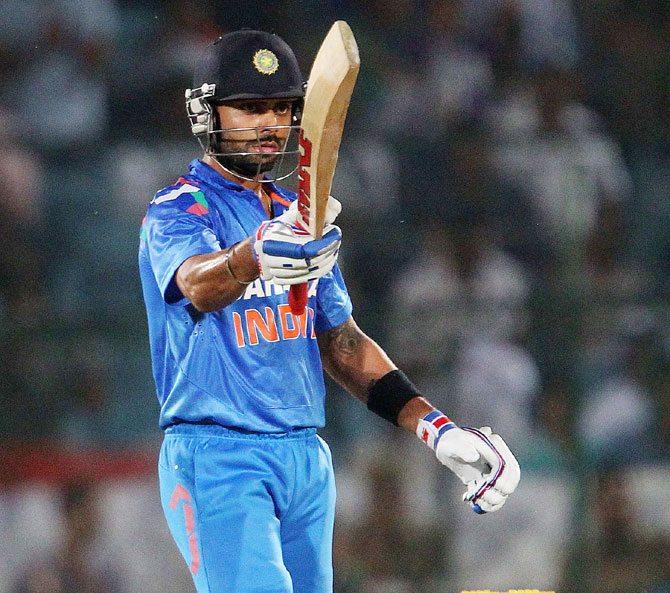 | « Back to article | Print this article |
India crush Australia in record run chase to level series
India thrashed Australia by nine wickets in the second one-dayer of the seven-match series in Jaipur.
Chasing a mammoth target (360), the home team won with a whopping 6.3 overs to spare.
It was the second highest chase in ODI history after South Africa's effort - 434 in 2006, also against Australia. In fact, the team from Down Under has been at the receiving end in the top four chases in the 50-over format.
Rohit Sharma (141 not out), Virat Kohli (100 not out) and Shikhar Dhawan (95) were the main contributors for India.
Earlier, Australian skipper George Bailey won the toss and elected to bat at Sawai Mansingh Stadium. Both the teams fielded an unchanged side.
Teams:
India: MS Dhoni (captain), Rohit Sharma, Shikhar Dhawan, Suresh Raina, Virat Kohli, Yuvraj Singh, Ravindra Jadeja, R Ashwin, Bhuvneshwar Kumar, R Vinay Kumar, Ishant Sharma
Australia: George Bailey (captain), Aaron Finch, Phil Hughes, Shane Watson, Adam Voges, Glenn Maxwell, Brad Haddin, James Faulkner, Mitchell Johnson, Clint McKay, Xavier Doherty.
Openers ensured Australia a good start
Australian openers Aaron Finch and Phil Hughes once again got off to a good start.
While Finch was the enforcer, pulling Vinay Kumar in particular with severity, Hughes complemented him by playing the second fiddle to perfection.
The duo added 74 runs in a highly productive opening partnership.
Finch was at his attacking best
Finch, as usual, was at his attacking best.
The 26-year-old pulled a slow bouncer from Vinay Kumar for a six to complete his second successive half-century of the series, third if one takes into account the fifty in the lone T20 game.
Just when it looked like the well-built Victorian was gearing up for a big knock, he failed to beat a direct throw from Suresh Raina stationed at mid-on. Finch scored 50 off 53 balls with seven fours and a six.
Hughes made an assured 83
Hughes took his own sweet time to settle down as he showed some assured footwork against spinners Ashwin and Jadeja.
He completed his 50 off 68 balls and brought up the team's hundred with a big six over deep mid-wicket off Jadeja's bowling.
His 83 came off 108 balls with eight fours and a six.
Watson contributed a quickfire 59
Shane Watson also did his bit. He did not attack from the word go but once he settled down, the all-rounder was in a mood to punish India's 'spin twins'.
Both Jadeja and Ashwin were guilty of bowling a lot of half-trackers as Watson time and again rocked on his back-foot to punch it through the region between mid-wicket and deep mid-wicket. Even one of his unintended airy shot off Jadeja's bowling also went for maximum while Ashwin's short delivery was dispatched into the stands.
It was rush of blood that became Watson's undoing as he was finally dismissed for a quickfire 59 off 53 balls. Having swatted a couple short balls from Vinay to the boundary, Watson failed to connect another rising delivery trying to hit a six as he was caught at the long-on boundary by Ishant.
He hit six boundaries and three sixes adding 108 runs for the second wicket with Hughes in only 16.4 overs
Maxwell pitched in with 53
George Bailey and Glenn Maxwell (53) to finish the innings with a flourish.
Indian bowlers conceded 122 runs in the last 10 overs of the innings as Bailey and Maxwell sent the Indian attack on a leather-hunt putting on a staggering 96 runs in only 8.3 overs for the fourth wicket.
Maxwell's 32-ball knock was inclusive of seven hits to the fence and one over it.
Bailey led from the front
George Bailey (92 not out) led from the front as the Australia notched Australia's highest total on Indian soil surpassing their previous best of 350 for four in Hyderabad in 2009.
This total also equalled their highest ever total of 359 for two against India made during 2003 World Cup final in South Africa as well as 359 for four in a VB Series match in Sydney back in 2004.
Bailey bludgeoned the Indian bowling as he faced only 50 balls in his unbeaten innings, hitting eight fours and five sixes.
Dhawan and Sharma added 174 runs first up
Chasing a mammoth victory target of 360 on a belter of a track at the Sawai Man Singh Stadium, India needed a great start.
And that is precisely what Rohit Sharma and Shikhar Dhawan ensured their team.
An opening stand of 174 between Dhawan and Sharma helped lay a solid foundation.
Dhawan made a quickfire 95
The chase practically started in the ninth over when Dhawan, in his bid to break the shackles, hit Shane Watson for three successive boundaries.
In the next over from Clint McKay, Rohit got a couple of boundaries more as 26 runs came off these two overs.
While Dhawan repeatedly charged out to the pacers piercing the off-side cordon, Rohit used field restrictions to good effect by lofting the deliveries over in-field.
Rohit hit Glenn Maxwell for a six over deep mid-wicket to bring up the team's 100 and then got his half century with a tickle down leg-side off Xavier Doherty.
If Dhawan muscled the deliveries, Rohit found a way to caress them to the boundary. However, after reaching his 50, Dhawan upped the ante with some sizzling strokeplay before James Faulkner got him to edge one trying to hit one shot too many.
His 86-ball stay had 14 sweetly timed boundaries as he missed out on what would have been a well-deserved hundred.
Sharma scored his first ton in three years
Rohit Sharma (141 not out from 123 balls) got a well-deserved third ODI century.
It was his first three-figure score since 2010, when he got back-to-back hundreds against Zimbabwe and Sri Lanka in a tri-series in the African nation.
Besides the opening partnership, Rohit was also involved in the match-winning 186-run second wicket stand with Virat Kohli, that came off only 17.2 overs and won the game for India.
The duo put on 100 runs in only 62 balls.
Kohli hit the fastest ever ODI century by an Indian
Kohli (100 not out) took a more than decent Australian attack to the task with a fastest ever ODI century by an Indian and seventh fastest in the world, scored in only 52 balls.
Kohli bested the 60-ball effort of Virender Sehwag against New Zealand in 2009.
It's his 16th ODI century in 115 matches. His innings had eight fours and seven sixes.
The effort of its batsmen helped Team India record its highest ever successful run chase and restore parity in the seven-match series.
